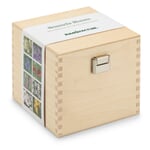Seed set in a wooden box

Seed set in a wooden box
- Exclusive selection: Seed sets
- Flowering and rich in variety: flowers and perennials
- Seedproof: suitable for reproduction
General Information
In our quest to guarantee you the best possible reliability and functionality in products, at times there is the need to be inventive: our team develops tailor-made solutions in-house or recommends product upgrades corresponding to our guiding principles to associated manufacturers.
The package contains:
Moth mullein (Verbascum blattaria)This plant, also known as cockroach mullein, bears its less sonorous name because it was once used to repel insect pests. Its appearance is much more attractive: the white-yellowish cup-shaped flowers have purple-hairy stamens in the middle in a beautiful color contrast. They sit on loose, racemose, 50-60 cm high inflorescences and spring from a dense, dark green rosette. This native species feeds numerous wild bees and beetles; it is also a food plant for the caterpillars of 13 different butterflies: Two species are specialized on the plant and need it for their survival. The plant is ideally suited to growing wild in sunny, dry places and reliably maintains itself in the right location through abundant self-seeding.
Corn cocklebur (Agrostemma githago)This former "field weed" was widespread until the time of major land consolidation; this valuable native plant is now on the Red List as "highly endangered" and is acutely threatened with extinction. It is therefore all the more important to provide it with a sunny spot in the garden, where it can find its place in herbaceous borders and borders as a highly attractive ornamental plant up to 1 m high. The red-purple flowers provide pollen and nectar for many wild bees and other insects from June to August. The elegant plant with its narrow, gray-green foliage is an annual, but will seed abundantly in the right location. It is poisonous in all parts.
Blue flax (Linum usitatissimum)This ancient cultivated plant is still grown today for oil and fiber production (flax), but it is also of exceptional ornamental value. The delicate, narrow leaves of a grey-green color perfectly accentuate the bright sky blue of the cupped flowers. The long flowering period extends from May to August. The annual plant, which grows to a height of 80 cm, will establish well in a suitable location.
Meadowsweet (Filipendula ulmaria)This native wild perennial with fragrant flowers accompanies streams and ditches in its natural habitat. It is long-lived, ideally suited to growing wild and is also a well-known medicinal plant up to 1.5 m tall. From June to August, the feathery, shimmering inflorescences provide pollen and nectar for no fewer than 37 species of wild bees, while the leaves feed numerous butterfly caterpillars and beetles.
St. John's wort (Hypericum perforatum)This perennial plant, also known as spotted knapweed, grows throughout Europe and western Asia. The herbaceous stems grow up to 1 m high; a special feature are the oil glands, which make the oval leaves appear dotted. The yellow flowers appear in June and July and provide food for 13 species of wild bees and 16 species of butterflies. St. John's wort is also an ancient medicinal plant that has been and is used as a tea, oil or tincture for numerous purposes.
Meadow daisy(Chrysanthemum leucanthemum)Almost everyone knows this typical meadow flower, but it is still too rare in domestic gardens, as it is of immense ecological value: almost 80 wild bee species feed on it - 12 of these species are specialized on the meadow daisy and therefore need the flower to survive. In addition, 12 butterfly species feed on the bright, white-yellow flowers, as well as caterpillars, hoverflies and beetles. The perennial shrub grows upright to a height of around 60 cm and is also suitable for planting in pots on balconies and terraces.
Summer adonis (Adonis aestivalis)The pretty "blood droplet" with its delicate, feathery foliage and bright blood-red flowers in May and June is one of those native plants that are rarely found in the wild and is on the Red List as "critically endangered". Giving it a new home in the garden is therefore an important contribution to species conservation in two ways: firstly, the plant itself is given a new habitat and secondly, it provides food for numerous wild bees. The perennial plant grows to a height of 50-60 cm.
Ladder of heaven (Polemonium caeruleum)This native wild perennial, also known as "Jacob's ladder", is rarely found in its natural habitat and is considered endangered. However, it is easy to keep in the garden, for example in mixed borders or as a solitary plant, and delights in June and July with its bright violet-blue, honey-scented flower panicles, which provide plenty of nectar and pollen for numerous insects. Very attractive with lush green, feathery foliage and up to 1 m in height.
Eightfold flower magic in a set
These seed sets provide you with organic quality flower seeds for your garden and balcony. Choose between native flowers and flowers for the cottage garden. Both sets are based on a suggestion from our product manager for the garden range, who contacted one of our seed suppliers. As rich as the perennials and flowers will bloom after sowing, the wooden box in which the respective seed bags are delivered to you is of high quality and beautiful. You are welcome to continue using it in the coming season to store seeds you have harvested yourself. Because our selection makes that possible too: All the species and varieties contained in them are seed-resistant and their seeds are suitable for replanting.
Product Information
Article Number 215023
- Exclusive selection: Seed sets
- Flowering and rich in variety: flowers and perennials
- Seedproof: suitable for reproduction
8 seed bags each in a birch plywood box (origin Austria/Europe). 11.2 × 10.6 × 11.2 cm. Weight (with contents) 265 g.
Seeds of eight native wild perennials that are either perennial or maintain themselves in the garden through abundant self-seeding. Native wild perennials and flowers are usually easier to care for, more robust, more vigorous and more frugal than cultivated garden perennials. They have adapted to our environmental conditions for thousands of years and often cope well with difficult locations, such as poor soil, heat or drought. In times of climate change, they are therefore increasingly recommended for use in our gardens, and for another reason too: they provide plenty of food for a wide variety of wildlife. This is because up to ten different insect species can benefit from just one native plant.
Have a question?
If you have a question concerning this product you are welcome to contact us. For this your E-Mail program will open.
Contact Us
For advice, spare parts or special requests - our customer service will take care of your questions and concerns, personally and competently.
You can reach us from Monday to Friday at +49 2309 939095 or anytime at info@manufactum.com
Exclusive at Manufactum
Several particularly noteworthy products from selected manufacturers are available from us in a distinct form. In any case, these special editions offer you a maximum of quality in material and functionality.
Find exclusive products


